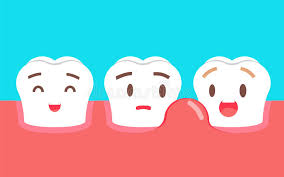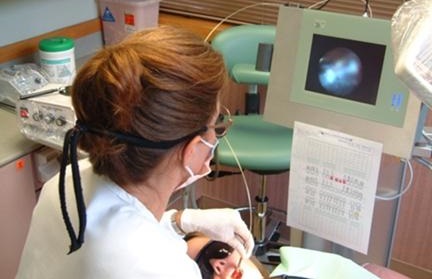Swollen gums are certainly not normal, ie. healthy. Swelling can be acute or chronic, isolated to a singular tooth/area of the mouth or can be more generalized. It can also go away and come back. None of these scenarios is good for your mouth and should be evaluated. Swelling or inflammation is our body’s response to harmful stimuli. It is a defense mechanism in an effort to heal the affected area. Chronic oral infection is one of the most widespread forms of inflammation and has been associated with a myriad of health issues such as heart attack, stroke, Alzheimer’s, pre-term birth and rheumatoid arthritis to name a few.
Causes of Swelling
- A major and common cause of swollen gums is periodontal disease. This chronic infection affects 50% of the adult population and after the age of 65, about 70% of the elderly will have gum disease! Other signs of periodontal disease may include bleeding gums, bad taste or odor, pain, teeth that move or are shifting or none of these. Untreated periodontal or gum disease will lead to bone loss and ultimately tooth loss. In addition, it is a contributing risk factor to many systemic health issues already noted above.
- Another somewhat common cause of swelling in the gum tissues is a condition called inadequate biologic width (IBW).The natural seal that develops around teeth, protecting the jaw bone from infection and disease, is known as the biologic width. This area can be “invaded” with what the body sees as a chronic irritant such as a crown or filling that is placed too deep. When someone has IBW, their gum tissues will be chronically swollen no matter how well they brush and floss. It can be extremely frustrating until an accurate diagnosis is made. The most common fallacy is that there is an allergic reaction to the metal or porcelain in the dental restoration
- On a more acute situation, gum swelling can be from an abscess. This is a more localized type of swelling, either from a gum infection or a tooth that is infected. A common indicator is very swollen tissues with a darker color and pain. It can also have what looks like a “pimple” on the side of the tooth or a bump. An abscess can be localized to a single tooth or area or represent a more generalized infection such as periodontal disease.
Treatment for Gum Swelling
- If the source of gum swelling is periodontal disease, the treatment can involve a deep cleaning (also called scaling and root planing), gum surgery, or even the use of a perioscope (similar to medical procedures such as orthoscopic surgery or an endoscope). It may or may not involve antibiotics either systemic via oral medications or locally delivered (placed in the gums). A big and necessary component of gum disease treatment is thoroughly removing the plaque with a home care program of good brushing and flossing as well as the possible addition of specialty tools. Regular, ongoing professional cleanings and check-ups are also essential to help with preventing swollen gums. Most adults would benefit from having their teeth cleaned every three months. A six month schedule is somewhat outdated and more suited to someone who has very little decay and a very healthy gum foundation–about a third of all adults.
- A procedure called crown lengthening is needed when the gum swelling is from inadequate width. This is a minor and often comfortable procedure when the gum and bone are both reduced a small amount thus providing the room the body likes between it and the dental restoration. Sometimes a restoration needs to be replaced. Scaling or a deep cleaning is not indicated as a treatment for swollen gums when the cause is IBW. In addition, more brushing and flossing is not the answer either. The space that the body needs must be created via a very minor surgical intervention.
- Abscesses are treated accordingly to which type it is. Should the acute infection be a gum abscess than the treatment has been reviewed above. Should the swelling be from a tooth infection, than likely a root canal is needed. Should either scenario be severe, teeth can be lost–and their is always the risk of the infection traveling into the bloodstream.
Did you know there is a dental specialty that deals just with gums? It is called periodontics and a periodontist is a dentist who is well-trained and experienced to make the a good diagnosis and treat the swelling you may have. Remember, swelling is not normal or healthy when present in the gums. Should you have any swelling, see us today and let us share our expertise and help you gain better oral health as well as overall health!



 Perioscopy: Is It For You?
Perioscopy: Is It For You?